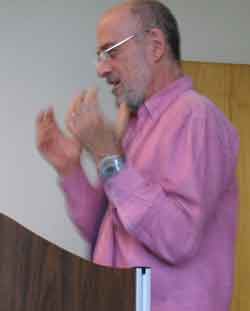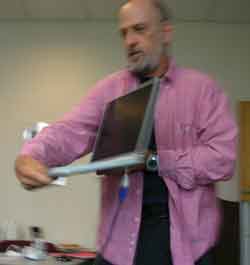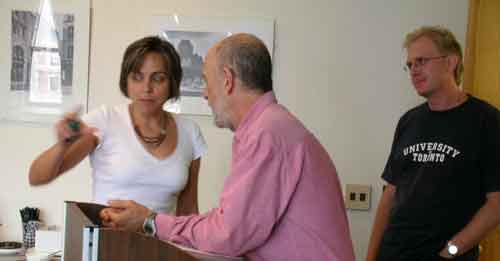

![]()
::: postdoc fellowships
::: senior fellowships
::: resident fellowships
::: associateships
![]()
being here
::: visiting
::: the last donut
::: photo album
::: center home >> being here >> last donut? >> 15 September 2006 |
Friday, 15 September 2006 His topic was truth. That was truth with a small t, not the philosopher's revered big T Truth. That was really the point. In the rough and tumble of ordinary discourse, essentially nothing we say is big T True. You know its 3 miles from here to downtown. That's true. But it's not True. It is certainly not exactly 3 miles. Maybe 2.96 or 3.04 miles is closer to the Truth. But even that is not True. Where exactly is downtown? It starts somewhere where the buildings cease to be smaller houses and start to be bigger office buildings. But there's no definite spot where it starts. It is not True that there is any definite distance to downtown. But it is true--little t true-- that it is 3 miles to downtown. You see the idea. It is not just in statements that give visitors directions around town. Virtually everything we say in any science is not strictly True. There's almost invariably some sort of weaseling. Every statement in classical physics, for example, needs an unspoken footnote that says "Well, that's not strictly True. You've got to allow for quantum effects that mean that if something isn't moving it doesn't really have a definite position at all." Virtually everything we say has some modicum of inexactness, imprecision, inaccuracy or vagueness in it. So virtually nothing we say is True. But a great deal of what we say is true and Paul's burden is to give us a way of thinking about things so that works out. He's a philosopher, so True or true, he feels an irresistible obligation to explicate. We learned what we might really mean by vague terms like inexactness, imprecision or inaccuracy. It was edifying, but not the main event. No one could accuse Paul of being a dry speaker or a bad sport. In fact I omitted to mention the ten minute hiatus between my sitting down and Paul starting to talk. Even though moments before we'd had Paul's Powerpoints nicely displayed on the screen, that glorious technical tangle of his computer, our projector and the cable now decided not to display anything beyond a black screen. One after another we went up to it, pushed that button and shook this connection, all to no avail. So Paul went it alone, tracing his pictures in the air with graceful fingertips. A lively speaker, I mused, eager to tell you his thoughts, can make do without Powerpoint. When the climax came and Paul wanted to announce his Sermon, he turned his computer to the room so we could see the word SERMON in bold letters on his screen. The big idea was that we get the little t truth to work out if we have a "platform." When I tell a visitor that downtown in 3 miles thataway, we share some presumptions. We know that downtown isn't a single point in the city's geography; and that it is not demarcated by a perfectly inscribed gold line of zero thickness on the pavement. But for the practical purposes of giving directions, we presume something like them is true. If we didn't, direction giving would become impossibly complicated. It just wouldn't be true that downtown is 3 miles away. This is the platform: a shared body of presumptions that lets us get on with our business and whose presumption helps makes our statements little t true. At least that is what I think the upshot is. I'm going to have lunch with Paul on Monday and I'll press him for more. I'm already worried that little t truth has very different properties from big T Truth. e.g. if you "or" falsehoods together, you never get a Truth: A or B or C or ... is not True unless at least one of A, B, C, ... is True. Similarly, if you "and" Truths together you never get something that is not True. Yet it seemed to me that both of these fail for little t truth. (Yes--but only sometimes, Paul assured me. In cases in which big T Truth matter, I can hang onto ordinary logic.) I was not the only one with worries. The room was eager and tense and we went into a question time that both fierce and jolly. When our immovable stopping time of 1:30 pm arrived, Paul was besieged at the lectern. It was, I was pleased to note, by our Visiting Fellows and they took turns in quizzing him for quite a while.
John D. Norton Paul Teller |
 Paul Teller was only visiting for a week or two, so we weren't demanding a talk. But he wanted to give one. It's the best way to open discussion and get useful feedback on your latest ideas. Paul was eager. I starting the usual academic ritual of the introduction: "Our speaker has a PhD from...blah blah...strained joke...flattering recovery...title." Paul cut me off at the PhD. "Can't we just get on with it and use the time for the talk?" Hmm, I thought, why not?! So I sat down and Paul took over.
Paul Teller was only visiting for a week or two, so we weren't demanding a talk. But he wanted to give one. It's the best way to open discussion and get useful feedback on your latest ideas. Paul was eager. I starting the usual academic ritual of the introduction: "Our speaker has a PhD from...blah blah...strained joke...flattering recovery...title." Paul cut me off at the PhD. "Can't we just get on with it and use the time for the talk?" Hmm, I thought, why not?! So I sat down and Paul took over. 
